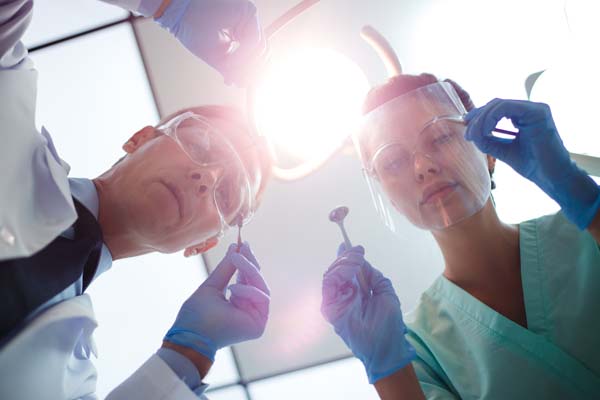The Process of Getting a Tooth Extraction
Going through a can be a daunting experience. Many people may feel anxious about the process, wondering what to expect and how it will affect them. In this blog post, we will discuss the process of getting an extraction, from the initial consultation to the post-extraction care. We will cover what you can expect at each step of the way, including any possible complications, so that you can make an informed decision about your oral health.
Reasons for tooth extraction
Tooth extraction is a dental procedure that involves removing a tooth from its socket in the jawbone. Although permanent teeth are meant to last a lifetime, there are certain situations where an extraction is necessary. Here are some common reasons why people undergo an extraction:
- Severely Damaged or Decayed Tooth: Teeth that are severely damaged or decayed beyond repair may need to be extracted to prevent further infection or damage.
- Overcrowding: When there is not enough space in the mouth to accommodate all teeth, tooth extraction may be required to create more space and prevent overcrowding.
- Gum Disease: In some cases, gum disease may have advanced to a stage where the tooth has become loose and is at risk of falling out. Extraction may be necessary to remove the damaged tooth and prevent the spread of infection.
- Impacted Wisdom Teeth: Wisdom teeth are the last teeth to develop, and in many cases, there may not be enough room for them to erupt properly. This can result in pain, infection, or damage to neighboring teeth, requiring their extraction.
- Orthodontic Treatment: In some cases, an extraction may be necessary as part of orthodontic treatment to create enough space for braces or aligners to straighten the teeth.
It is important to note that an extraction should only be done if it is absolutely necessary. Your dentist will thoroughly evaluate your situation before recommending extraction as an option.
Preparing for the procedure
If your dentist has recommended an extraction, it is natural to feel nervous about the procedure. However, there are a few steps you can take to prepare yourself mentally and physically.
First, make sure you understand why the tooth needs to be extracted. Common reasons for an extraction include severe decay or infection, overcrowding, or impacted wisdom teeth. Knowing the reason for the extraction can help you feel more confident about the procedure.
Next, discuss any concerns or questions you have with your dentist. They can explain the procedure in more detail and address any worries you may have.
Your dentist may also give you instructions on how to prepare for the extraction. This may include avoiding food or drink for a certain amount of time before the procedure or taking antibiotics if you have an infection.
It is important to arrange for someone to drive you home after the extraction, as you may be groggy from the anesthesia. You may also want to take a day or two off work to allow yourself time to rest and recover.
The extraction process
Once you have been through all the necessary preparations for an extraction, it is time for the actual procedure. Here is what you can expect during a typical extraction:
Numbing the area
To start, your dentist or oral surgeon will administer a local anesthetic to numb the area around the tooth to be extracted. This ensures that you will not feel any pain during the procedure.
Loosening the tooth
Once the area is numb, your dentist or oral surgeon will use a special tool called an elevator to loosen the tooth from its socket. This is done by gently rocking the tooth back and forth to widen the socket and break the ligaments holding the tooth in place.
Removing the tooth
Once the tooth is sufficiently loosened, your dentist or oral surgeon will use forceps to grasp the tooth and carefully remove it from the socket. The entire process is usually completed in just a few minutes.
Closing the wound
After the tooth is removed, your dentist or oral surgeon may need to close the wound with a few stitches. In most cases, the stitches typically dissolve on their own within a week or two.
While extractions may sound intimidating, it is a common and relatively straightforward dental procedure that can be performed safely and effectively by an experienced dentist or oral surgeon. With the right preparation and care, you can get through the process with minimal discomfort and achieve a healthy, happy smile.
Post-procedure care and recovery
After your extraction procedure, your dentist will give you instructions on how to care for your mouth and promote healing. It is important to follow these instructions carefully to minimize the risk of complications and ensure a smooth recovery.
- Rest and relax: It is normal to feel a little groggy after the anesthesia wears off. Take it easy for the rest of the day and avoid any strenuous activities.
- Ice the area: Apply ice to your cheek for the first 24 hours after the procedure to help reduce swelling.
- Take pain medication: Your dentist may prescribe pain medication to help manage any discomfort you may experience.
- Eat soft foods: Stick to soft foods like soup, pudding, and mashed potatoes for the first few days after the procedure. Avoid crunchy or spicy foods that can irritate the area.
- Brush and floss gently: You can resume brushing and flossing the other teeth in your mouth the day after the procedure, but be sure to be gentle around the extraction site.
Contact your dentist
If you experience any unusual pain, bleeding, or swelling, contact your dentist immediately. With proper care and attention, most people recover fully from an extraction within a few days.
Request an appointment here: https://agourahillscosmeticdentists.com or call The Smile Spa at (818) 573-2196 for an appointment in our Agoura Hills office.
Check out what others are saying about our dental services on Yelp: .
Recent Posts
For patients who have been suffering from a damaged or infected tooth, finally getting the tooth extracted can feel like a relief. However, bleeding after a tooth extraction can be worrisome and inconvenient. Before a patient undergoes a tooth extraction, it can be helpful to know what to expect in terms of bleeding.After a tooth…
Worried about dental emergencies and what you should do if one occurs? Continue reading to find out more. Dental emergencies can be frightening, especially when they involve a broken tooth. However, it is important to know that modern-day dentistry has allowed for the evolution of a lot of different treatments to address and treat dental…
A broken tooth is a common dental issue that fills most people with dread, especially when the crack is near the front of the mouth. Front teeth fractures are quite common among children, teenagers, and young adults. Fortunately, a dentist can recommend various repair or replacement options for damaged front teeth to help patients resume…
Wondering when a tooth infection is considered a dental emergency? Read on to find out. This review discusses the situations in which an infected tooth is considered a dental emergency and requires immediate treatment from a dentist.An infected tooth that is not properly treated in a timely manner can lead to some severe issues, including…


